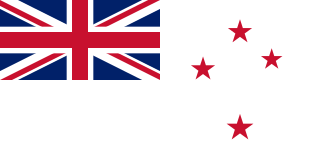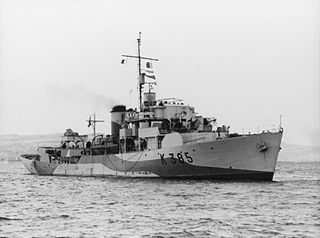| Historic ships of the Royal New Zealand Navy |
|---|
 |
| Alphabetical list |
Commissioned frigates of the Royal New Zealand Navy from its formation on 1 October 1941 to the present:
| Historic ships of the Royal New Zealand Navy |
|---|
 |
| Alphabetical list |
Commissioned frigates of the Royal New Zealand Navy from its formation on 1 October 1941 to the present:
| Name | Dates | Career | Fate |
|---|---|---|---|
| HMNZS Hawea (F422) | 1948–1965 | ||
| HMNZS Kaniere (F426) | 1948–1967 | ||
| HMNZS Pukaki (F424) | 1948–1966 | ||
| HMNZS Rotoiti (F425) | 1948–1967 | ||
| HMNZS Taupo (F423) | 1948–1962 | ||
| HMNZS Tutira (F420) | 1948–1951 |
| Name | Dates | Career | Fate |
|---|---|---|---|
| HMNZS Blackpool (F77) | 1966–1971 | Former HMS Blackpool on loan from RN | Sold for scrapping in 1978. |
| Name | Dates | Career | Fate |
|---|---|---|---|
| HMNZS Otago (F111) | 1960–1983 | Purchased from RN before completion | Sold for scrapping in 1987. |
| HMNZS Taranaki (F148) | 1960–1982 | Sold for scrapping in 1983. | |
| Name | Dates | Career | Fate |
|---|---|---|---|
| HMNZS Canterbury (F421) | 1971–2005 | Scuttled as dive wreck | |
| HMNZS Southland (F104) | 1983–1995 | Former HMS Dido | Sold and broken up for scrap and parts |
| HMNZS Waikato (F55) | 1965–1998 | Scuttled as dive wreck | |
| HMNZS Wellington (F69) | 1982–2000 | Former HMS Bacchante | Scuttled as dive wreck |
| Name | Dates | Career | Fate |
|---|---|---|---|
| HMNZS Te Kaha (F77) | 1997–current | Active | |
| HMNZS Te Mana (F111) | 1999–current | Active |
Rear admiral is a flag officer rank used by English-speaking navies. In most European navies, the equivalent rank is called counter admiral.

The ensign is a maritime flag that is used for the national identification of a ship. The ensign is the largest flag, generally flown at the stern (rear) of the ship while in port. In ports, depending on the ship's origin, it is sometimes identical with a jack on the bow of the ship. Jacks are more common on warships than on merchant ships.

The Royal New Zealand Navy is the maritime arm of the New Zealand Defence Force. The fleet currently consists of nine ships. The Navy had its origins in the Naval Defence Act 1913, and the subsequent purchase of the cruiser HMS Philomel, which by 1921 had been moored in Auckland as a training ship. A slow buildup occurred during the interwar period, and then perhaps the infant Navy's most notable event occurred when HMS Achilles fought alongside two other Royal Navy cruisers at the Battle of the River Plate against the German ship, Graf Spee, in December 1939.
New Zealand Naval Forces was the name given to a division of the Royal Navy. The division was formed in 1913 and it operated under this name until 1921, when it became the New Zealand Division of the Royal Navy.

Devonport Naval Base is the home of the Royal New Zealand Navy, located at Devonport, New Zealand on Auckland's North Shore. It is currently the only base of the navy that operates ships, and has been in use as a navy base since 1841. The base consists of HMNZS Philomel, the Fleet Support Organisation, and the Fleet Personnel and Training Organisation.

The Australia Station was the British, and later Australian, naval command responsible for the waters around the Australian continent. Australia Station was under the command of the Commander-in-Chief, Australia Station, whose rank varied over time.
HMNZS Taupo is a Lake-class inshore patrol vessel of the Royal New Zealand Navy. Taupo was delivered to the Ministry of Defence on 28 May 2009 and commissioned into the Royal New Zealand Navy on 29 May 2009. Taupo is the third ship of this name to serve in the Royal New Zealand Navy and is named after Lake Taupo. Both Lake-class were sold to the Irish Naval Service in 2023 and delivered in May 2023. They are due in service sometime in 2024 after commission works are completed. Both are planned to be based on the east coast of Ireland, where sea conditions suit their capabilities.

HMNZS Arabis was a modified Flower-class corvette of the Royal New Zealand Navy (RNZN). Built for the British Royal Navy as HMS Arabis, she was transferred to the RNZN on completion. She was commissioned in 1944 and decommissioned in 1948.

This is a list of commissioned corvettes of the Royal New Zealand Navy from its formation on 1 October 1941 to the present.

Commissioned survey and research vessels of the Royal New Zealand Navy from its formation on 1 October 1941 to the present:

Commissioned cruisers of the Royal New Zealand Navy from its formation on 1 October 1941 to the present:

The New Zealand Division of the Royal Navy also known as the New Zealand Station was formed in 1921 and remained in existence until 1941. It was the precursor to the Royal New Zealand Navy. Originally, the Royal Navy was solely responsible for the naval security of New Zealand. The passing of the Naval Defence Act 1913 created the New Zealand Naval Forces as a separate division within the Royal Navy.

Commissioned logistic and support vessels of the Royal New Zealand Navy from its formation on 1 October 1941 to the present:

Diving tenders of the Royal New Zealand Navy from its formation on 1 October 1941 to the present. There have been four diving tenders, all with the same name. The current tender was commissioned in 2019.

Commissioned training boats of the Royal New Zealand Navy from its formation on 1 October 1941 to the present:

834 Naval Air Squadron was a Naval Air Squadron of the Royal Navy's Fleet Air Arm. The squadron was formed in Jamaica in December 1941 as a torpedo bomber squadron equipped with Fairey Swordfish aircraft. The squadron was embarked on HMS Archer from March 1942 to February 1943 and involved in convoy escorted duties in the Atlantic and Mediterranean. 834 NAS then joined No. 19 Group RAF Coastal Command for duties in the English Channel. In June a flight of Supermarine Seafires was formed and the next month the squadron was embarked on HMS Hunter. The squadron took part in the Salerno landings in September, before being transferred to HMS Battler to provide convoy escort duties in the Indian Ocean. 834 NAS received a further flight of 6 Wildcat Vs in April 1944 and the Seafire flight was disbanded in July. The squadron returned to the UK in November 1944 and was disbanded in December.
The 1947 King's Birthday Honours in New Zealand, celebrating the official birthday of King George VI, were appointments made by the King on the advice of the New Zealand government to various orders and honours to reward and highlight good works by New Zealanders. They were announced on 12 June 1947.
The 1954 Queen's Birthday Honours in New Zealand, celebrating the official birthday of Elizabeth II, were appointments made by the Queen on the advice of the New Zealand government to various orders and honours to reward and highlight good works by New Zealanders. They were announced on 10 June 1954.
The 1956 Queen's Birthday Honours in New Zealand, celebrating the official birthday of Elizabeth II, were appointments made by the Queen on the advice of the New Zealand government to various orders and honours to reward and highlight good works by New Zealanders. They were announced on 31 May 1956.
The 1923 King's Birthday Honours in New Zealand, celebrating the official birthday of King George V, were appointments made by the King on the recommendation of the New Zealand government to various orders and honours to reward and highlight good works by New Zealanders. They were announced on 2 June 1923.